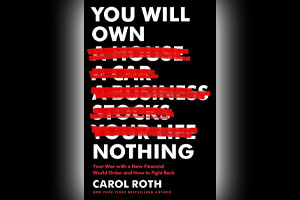
We tend to take private property for granted and only realize its importance when it is threatened. The gradual process of taking property away is the subject of an intriguing book titled You Will Own Nothing: Your War with a New Financial World Order and How to Fight Back by Carol Roth. The author unmasked the war on property waged on today’s postmodern battlefield.
Most conservatives are aware of the more obvious assaults on the institution of private property. It is found in excessive taxation in its many forms, whether in cities, counties, states or nations. We are also familiar with Marxist movements, such as Antifa, that openly advocate socialism and public activism that attacks private property. Giant corporations promote the paradox of socialistic and woke ideologies that concentrate power in the state.
This book focuses on the subtle attacks on private property that might go unnoticed until it is too late.
The book’s main title, “You Shall Own Nothing,” is taken from a discussion at the World Economic Forum that meets yearly at Davos. The author shows how certain systems are in place to limit a person’s access to ownership.
One example is a social credit score which exists in Communist China. A person is automatically graded by his or her support of the communist regime. Thus, certain privileges are available only to those with a high enough social credit score. If a person tries to travel by train or air with a low social credit score, the system refuses to issue a ticket.
A second trend is the transformation of owners into subscribers. Some new vehicles in South Korea, for example, come with options that are only available with a monthly subscription fee. The person does not own the entire car but only the basic platform. The idea is to reduce all ownership to subscriptions.
Help Remove Jesus Bath Mat on Amazon
The author spends considerable time analyzing the now-declining corporate rating system known as ESG, which stands for Environmental, Social, and Governance policy that companies must implement to stay in business. This is an American-style social credit system. Companies and organizations can be “canceled” by violating the leftist standards used by these systems.
Another attack on property consists of high property taxes and “green” requirements attached to home and business ownership.
Resource allocation can also be a means of controlling property. The “overuse” of water can be a pretext to restrict ownership. Some sources cited in the book claim that Americans consume too much water. They propose restrictions on water consumption by making water artificially expensive.
The author’s critique is backed up by many compelling charts demonstrating her points. She does not call for a disordered revolution to make things right but a counter-revolution that defends order and prevents chaos.
Satanic Christ Porn-blasphemy at Walmart — Sign Petition
Unfortunately, the author does fall into the trap of mislabeling the political, economic and cultural figures involved in these attacks as “elites.” This common conservative habit fails to realize that these figures are actually pseudo-elites or counterfeit leaders. True elites connected to the community provide solutions through their capacity to unite society for a common purpose.
The final chapter has practical suggestions on how we might fight back. The author recommends not supporting businesses that undermine our values, even if it means paying more. She also suggests finding others who share common ideals for mutual encouragement and support.
The book is very helpful because it contains much accurate and eye-opening information and suggestions about surviving the crisis in America.
What is missing is a discussion of the fundamental moral causes that change society and lead to these attacks on private property.
America has turned away from God and His commandments. Until we return to God and again follow His commandments, we will not see a permanent solution.


